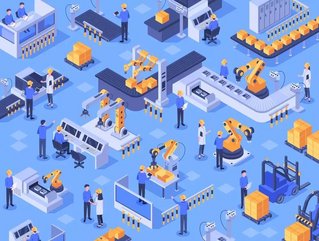CIPS: future technology in supply chain & logistics

“The future of supply chains is being transformed globally by the development of a more digitalised environment, where value chains are connected, and distribution systems are increasingly intelligent, autonomous and automated,” stated CIPS.
When it comes to those that are striving to drive industry 4.0 in their operations, any strategy “must begin with an understanding of their current level of maturity in their specific content or supply network,” commented CIPS.
However immediate challenges and barriers for organisations include:

Industry 4.0: what it means for supply chain technology
“Industry 4.0 represents the approach of the Fourth Industrial Revolution, where Information and Communication Technologies (ICT) form the infrastructural foundation for tomorrow’s innovative industrial technologies,” defined CIPS.
The advanced technologies harnessed in Industry 4.0 is set to restructure the entire production system by transforming analogue and centralised workflows in ones that are digital and decentralised.
CIPS expected such advancements to drive huge improvements in relation to flexibility, efficiency and the automation of distribution, as well as eliminate unnecessary production costs; improve the transport of goods and services and business performance; increase throughput; reduce cycle times and maintain quality.
Read now, CIPS’s ‘Future technologies in supply chain and logistics” 2020 report’
How to prepare for industry 4.0
When it comes to developing smarter and better-connected supply chain networks, CIPS emphasises that Industry 4.0 will play a vital role in providing “supply chain transparency, real-time tracking, better forecasting, critical thinking, improved judgement, a reduction of inefficiencies, and an increased automation of repetitive tasks.”
Reasons why organisations are investing in supply chain technology

With CIPS reporting that “those operating in supply chains are in a good position to reap the benefits of new technologies, with 66% already focusing on service delivery models,” the company also states that “those who invest in the big impact technologies may leap-frog their competitors over the coming decade.”
16 technologies that are expected to disrupt the supply chain industry include: cloud computing, Big Data Analytics, internet of things (IoT), smart sensors, cyber physical systems, 3D printing (additive manufacturing), machine learning, virtual reality (VR), artificial intelligence (AI), manufacturing execution system, blockchain, drones, robots, collaborative robots, augmented reality (AR), and autonomous vehicles.
To read CIPS’s latest reports on technology in supply chain and logistics, click here!
For more information on procurement, supply chain and logistics topics - please take a look at the latest edition of Supply Chain Digital.
- How the C3 AI Supply Chain Suite Drives Increased ResilienceTechnology
- The Art of Supply Chain Planning with Gartner, SAP, KinaxisSupply Chain Risk Management
- Top 10: Women in Supply Chain in the Middle East and AfricaOperations
- How to Boost Supply Chain Visibility with Tive and ArvatoSupply Chain Risk Management






